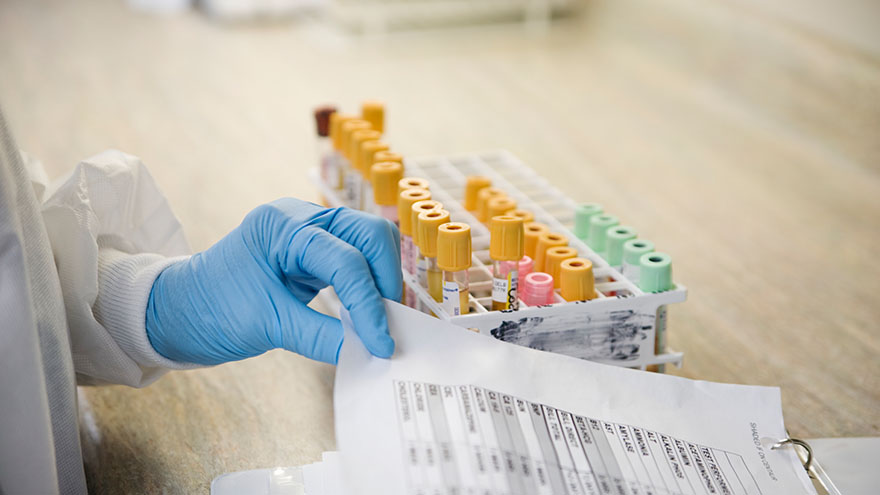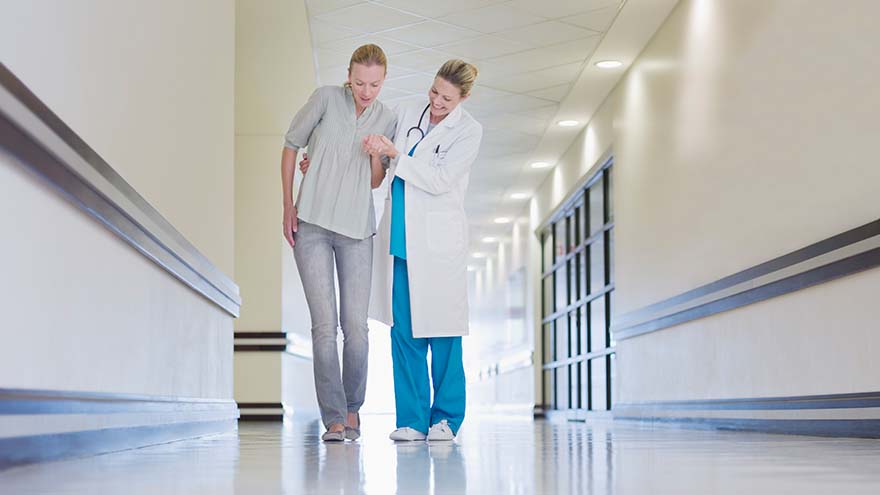Search
-
Do You Know the Signs of a Concussion?
It’s important to be aware of the risk of a concussion, which can have serious health implications. Susan Park, MD, discusses the effects of concussions and how they can be prevented. According to Susan Park, MD, a Renown Medical Group doctor who specializes in sports and family medicine, concussions are a serious issue — especially among children whose developing brains “are more susceptible to brain injury and long-term effects from concussions.” All parents, coaches and athletes, she points out, should be aware of the signs and symptoms of concussions and take precautions to avoid them. What is a concussion and how does it occur? Dr. Park describes a concussion as a traumatic brain injury resulting from direct or indirect impact to the head or body, during which the brain shakes back and forth in the skull. This may cause some bruising of the brain. In severe cases, traumatic head injuries can cause bleeding, which if not treated quickly, can be fatal. What are the health implications of a concussion? Symptoms of drowsiness and confusion can be a sign of a concussion after a head injury. Some short-term effects may include headaches, dizziness and difficulty concentrating. Long-term concerns can further include mood disorders, sleep disturbance and problems with cognitive function-concentration, which may affect school performance. What sports carry the highest risk of suffering a concussion? Dr. Park notes participation in any impact sport can result in a head injury. But among school-age kids, she treats more concussions from football and soccer than any other sport. However, during the winter months, skiing and snowboarding injuries can be a common cause of concussions Any blow to your head, neck or upper body can result in a concussion with symptoms including, but not limited to, feeling dazed or confused, dizziness, nausea/vomiting or a headache. Initial treatment of concussions varies depending on severity. Rest, avoiding vigorous activity and a reduced school workload help young athletes recover after a concussion. Dr. Park notes that sometimes further imaging and an ER visit will be required. Otherwise, rest from activities is the main treatment, along with not returning to sports activities until further clearance from a healthcare provider.
-
A Blood Test: What Valuable Clues It Tells Your Doctor
Blood. It can make you squeamish to think about it, yet every drop is vital to your health. In fact, a tiny vial of it can tell your doctor a wealth of information. We asked Benjamin Hansen, M.D., to explain what providers can learn from a blood test and why it’s important to get one as part of your annual checkup. CBC, the initials, sound innocent enough, right? In fact, when your favorite TV doctor orders a CBC, or complete blood count, it’s often the first step in getting an overall picture of your health. "It primarily measures white blood cells, red blood cells and platelets," explains Hansen. Although a blood test is one test you don’t have to study for, the measurements it takes can point to a host of information. What a Blood Test Says About Your Health White Blood Cell Count "The white blood cell count in your CBC helps us to determine the strength of your immune system," says Hansen. "It also helps us to determine the likelihood of infection because white blood cells fight off infection. Knowing the white blood cell count can also be helpful in patients with compromised immune systems, such as those on certain medicines or with conditions that impair immunity," he adds. White blood cells are made in your bone marrow and are alive only one to three days. Therefore, your body is constantly making them. Red Blood Cell Count "The red blood cells carry oxygen from your lungs throughout your body, while also carrying away waste. The hemoglobin (red blood cell protein) count is important because it helps us determine how well you're able to deliver oxygen from your lungs to the rest of your body," states Hansen. If these counts are low, you may have trouble breathing or experience fatigue. Red blood cells also grow in bone marrow, but they have a long lifespan – generally 100 to 120 days. Why Get a Blood Test? Although the CBC is just one type of blood test, according to the National Institutes of Health (NIH) there are a number of blood tests available that can help check for diseases and conditions such as: Heart disease Cancer Anemia (low iron) Diabetes High cholesterol Alcohol or Drug use disorder HIV/AIDS Additionally some tests show how well your kidneys, liver, heart and other organs are working. If you are taking a medication, a blood test can also let your provider know if it is helping you. What to Expect From a CBC Blood Test When you are not feeling well, it may take some detective work to figure out what is wrong and sometimes a CBC can be helpful. With this in mind, a lab order from your provider is needed to order a CBC blood test. Some blood tests require you to not eat food (fast) eight to 12 hours before the blood draw. Your provider will let you know the type of blood test(s) they are ordering for you. Usually it's important to drink plenty of water before your blood test, to make it easier to locate your veins. Generally a small sample of blood is taken from your arm vein and then sent to a lab for analysis. Discussing Your Results "A CBC can help your provider determine if there is an infection, your level of immunity, if you are anemic or if you are prone to bleeding," says Hansen. When to Get a Blood Test "A CBC is usually ordered for a specified purpose. If you think you might need a CBC, please call your provider. It's also important to see your provider regularly to keep an eye on your health. Many patients should see their provider at lease yearly," Hansen clarifies.
Read More About A Blood Test: What Valuable Clues It Tells Your Doctor
-
When Is It Time to See a Physiatrist
Physiatry (fi-zahy-uh-tree), also referred to as physical medicine and rehabilitation, encompasses the diagnosis, prevention and treatment of disabilities or injuries related to the brain, nerves, bones and muscles. The goal of this specialty is to maximize physical functioning, greatly decrease or eliminate pain, foster independence and improve quality of life for those suffering with a disability, chronic pain and physical impairments. Who Is It for? Physiatry can help patients with functional deficits and secondary medical conditions as a result of the following: Amputation Brain Injury Osteoarthritis Spasticity and Movement Disorders Spinal Cord Injury Spine Pain Sports-Related Injuries Stroke Some of these medical conditions can often cause chronic pain or impede physical functioning, ultimately affecting a person’s overall well-being and making it difficult for them to sustain a desired quality of life.
-
 Renown Lab Services - USA ParkwayRenown Lab Services - USA ParkwayHours
Renown Lab Services - USA ParkwayRenown Lab Services - USA ParkwayHours
Mon-Fri7 a.m. - 12 p.m.Sat-SunClosed -
Spine, Sports and Pain Management
How We Can Help You may benefit from treatment for neuromuscular (nerve, muscle and bone) disorders – that cause pain and impair normal functions. But, first, consult your primary care physician for a referral to Renown Health's Spine, Sport & Pain Management. Dr. Keating, Medical Director and his colleagues, Dr. Su and Dr. Storm, will customize a treatment plan that best suits your needs and lifestyle while providing the most effective care possible. For more information: Call 775-982-3608 | Fax 775-982-8001
-
Renown Health In-House Lab Now Processing COVID-19 Tests for Patients and Care Providers
Expanded test processing capabilities is resulting in faster test results, lessening the load on the state lab, and helping keep patients, care providers and the community safe. Renown Health announced today that its in-house laboratory is now able to process up to 500 COVID-19 tests for hospital patients and care providers each day. The organization has invested in expanded test processing capabilities to better serve the community amid the coronavirus pandemic, and to increase testing available across the state. Next month, Renown anticipates continuing to further expand testing capacity and doubling its capacity to be able to provide 1,000 tests per day in preparation for the continued response to the pandemic. “The COVID-19 pandemic is not going away- it is still with us. I am concerned by the number of new cases and hospitalizations we are seeing across northern Nevada. We must do more testing. We need broader capabilities around making sure we have broad-scale surge testing available, so we can help people identify if they have COVID-19 or not,” said Tony Slonim, MD, DrPH, Renown’s President & CEO. “If I could test 60,000 people in northern Nevada for COVID-19, like we did for the Healthy Nevada Project, we could better understand with data and facts the proportion of people who actually have COVID-19 versus those that just have the sniffles and a cold.” Launched in 2016, the Healthy Nevada Project https://healthynv.org/ is a community-based population study where free genetic testing is provided to thousands of Nevadans to learn about the health of the community and each person’s genetic risks. As of Tuesday, 2,286 people in northern Nevada have been tested, and positive cases were nearing 700. Seventy four people in northern Nevada have died; 1,526 have recovered. https://www.washoecounty.us/ Dr. Slonim says it would help him and others make important decisions and plans for coronavirus with evidence. He wants to be able to test many more individuals across northern Nevada. “Testing is pivotal upstream, so you can prevent consequences downstream,” said Dawn D. Ahner, DSc, FACHE, Chief Operating Officer – Renown Acute Services. “By processing our own tests, we’ve reduced the turnaround to receive results to just 12-24 hours, which will have a profoundly positive impact on our community, and lightens the load on the State lab. “Testing is an incredibly important tool in our fight against coronavirus,” said Tim Stephens, vice president of ancillary services. “There's no 100% perfect test, however, the PCR tests are so incredibly sensitive, that when done perfectly, have a very low false-positive rate. Certified labs like Renown’s use a number of procedures to reduce the risk of false test results.” “The expansion of our lab’s new testing capabilities during this time is a testament to the innovative and important work being done here at Renown,” said Erik Olson, CEO of Renown Regional Medical Center. “Throughout the pandemic, our ancillary team, which includes services like laboratory, radiology and pharmacy, has been quick to adapt to the needs of our patients and our community. I am pleased that we are able to generate critical test results for patients and providers as we continue the fight against COVID-19 and go the extra mile for safety.” Going the extra mile for safety As an added safety measure, acute hospital patients; patients preparing for surgery, and care providers who may have come into contact with those positive for COVID-19, are among those that receive mandatory PCR testing from Renown at this time. For patients receiving hospital care, these tests help determine if patients should be placed in a designated area of the hospital to mitigate the risk of transmission to those not infected. Furthermore, all surgery patients are tested ahead of their surgery and self-quarantine prior to their surgical procedure at Renown Regional Medical Center and Renown South Meadows Medical Center. How do PCR tests work? PCR tests use a sample of mucus typically taken from a person's nose or throat. The test looks for the genetic material of the coronavirus, using a technology called PCR to detect if the viral genetic material is present. Those actively infected with the virus will show the existence of that material. Individuals who think they should be tested for COVID-19 are encouraged to call their medical provider or contact the Washoe County Health District at 775-328-2427 for a risk assessment. For up-to-date information on Renown’s approach to keeping our community safe, visit our website at renown.org/covid-19/. Please see b-roll for this story here. About Renown Health Renown Health is a locally governed and locally owned, not-for-profit integrated healthcare network serving northern Nevada, Lake Tahoe and northeast California. Renown is one of the region’s largest private employers with a workforce of more than 7,000. It comprises three acute care hospitals, Renown Children’s Hospital, Renown Rehabilitation Hospital, the area’s most comprehensive medical group and urgent care network, and the region’s largest and only locally owned not-for-profit insurance company, Hometown Health. Renown has a long tradition and commitment to continually improve the care and the health of our community. For more information, visit renown.org.



